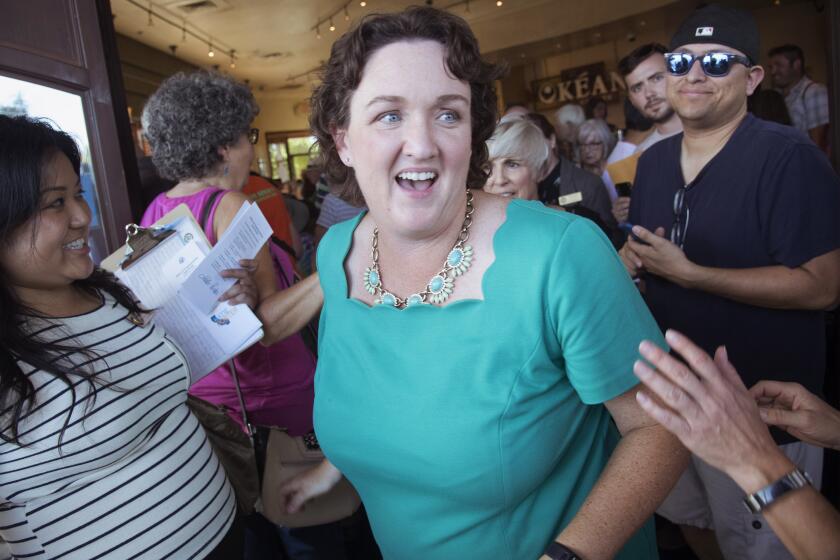Reviewing Three Key Policy Areas
- Share via
At the start of the year in this column, I discussed three areas of economic policy in which important developments could help shape the nation’s economic performance. The three were the outlook for the U.S. budget under the new Gramm-Rudman-Hollings law; the impact of tax reform, which the House had passed at the start of the year but which the Senate figured to resist in important ways, and the prospects for monetary policy once Reagan appointees constituted a majority on the Federal Reserve’s board of governors.
With the year now more than half over, we can review how things are working out in these areas.
On the budget front, a lot has happened but little is settled. Gramm-Rudman-Hollings specified targets for future budget deficits and provided an automatic formula for across-the-board spending cuts if, at the start of any fiscal year, the deficit was projected to be above the target by more than $10 billion.
This spring the Supreme Court ruled the mechanism for implementing the automatic cuts unconstitutional. This leaves the deficit targets still in place, but now there is no mechanism for achieving them if the normal budgeting process leaves the deficit at higher-than-acceptable levels.
Of course, avoiding the across-the-board cuts was always the real agenda for both Congress and the Administration. The threat of such arbitrary cuts was designed to induce other actions though the normal budgeting process--cuts in specific programs and revenue increases--that would achieve the deficit targets.
President Opposed to Finding New Revenue
Congress could still legislate the across-the-board cuts contemplated by Gramm-Rudman-Hollings, but there is little enthusiasm for doing so. For one thing, the President remains stubbornly opposed to finding new revenue. Program cuts in defense and elsewhere would have to do the whole job of narrowing the deficit.
His own advisers, as well as most member of Congress, are warning against such drastic cuts on grounds that they would do too much damage to needed programs.
Many reductions and freezes are being made in any case. But everyone fears the additional, arbitrary reductions that would come from applying the across-the-board formula if the normal budget process fails to reach the target.
Apart from this resistance, meeting the prescribed $154-billion deficit target for fiscal 1987 ($144 billion with $10 billion of leeway) would now involve a sharper tightening of fiscal policy than had been expected at the start of the year. This is because slow growth in the economy now figures to produce lower revenue in 1987 than had been expected earlier.
Thus, to reach the same deficit target, programs would have to be cut more or taxes increased more.
This more severe budget tightening that would now be needed to meet the fiscal 1987 deficit target would hit the fiscal brakes too hard and too abruptly and possibly push the economy toward recession. Gramm-Rudman-Hollings was never good economic policy because it mandated a path for cutting budget deficits without regard to the state of the economy. That flaw has become glaringly apparent in just its first year.
At this point, the best outcome would be a face-saving way around adherence to the Gramm-Rudman-Hollings target for fiscal 1987. A most likely outcome is a deficit of around $175 billion, which would still represent substantial progress in deficit reduction.
If the economy is none too robust for other reasons, even that deficit target will risk being too restrictive.
Landmark Improvement in Tax System
Tax reform is where the surprise since the start of the year has been greatest. In its early deliberations, the Senate Finance Committee scuttled most of the reforms that the House had proposed, but then it surprised everyone by coming up with a last-minute proposal that was even more sweeping than the tax reforms in the House bill.
The plan that has emerged from the House-Senate conference committee represents a landmark improvement in the tax system for the long run. In the short run, however, tax reform will put some additional downward pressure on the economy. This is because the reduction in a range of investment incentives--especially those affecting construction activities that have been financed largely by tax shelters--will initially depress activity in some sectors.
Normally, such weakness could be offset by strength from some other source. This time, however, if the economy is already being hit with a substantial budget tightening in pursuit of deficit reduction, only monetary policy will be left to compensate.
At the Federal Reserve Board, Chairman Paul A. Volcker’s authority was challenged by the new Reagan majority, but not for long. Preston Martin, who resigned from the Board after a behind-the-scenes showdown with Volcker, served the useful purpose of pressuring the Fed toward easing monetary policy when the economic expansion became uncomfortably slow earlier this year.
The pressure to continue easing remains so that, for now, we have the best of both worlds: Volcker’s prestige and credibility as a dedicated inflation fighter, and a policy posture whose immediate concern is to get the economy expanding faster.
But if Congress, in dealing with its deficit targets and with tax reform, puts too much of a brake on the economic expansion, 1987 will sorely test the willingness and even the ability of monetary policy to offset this drag from the fiscal side with easier money and lower interest rates.
More to Read
Get the L.A. Times Politics newsletter
Deeply reported insights into legislation, politics and policy from Sacramento, Washington and beyond. In your inbox twice per week.
You may occasionally receive promotional content from the Los Angeles Times.










